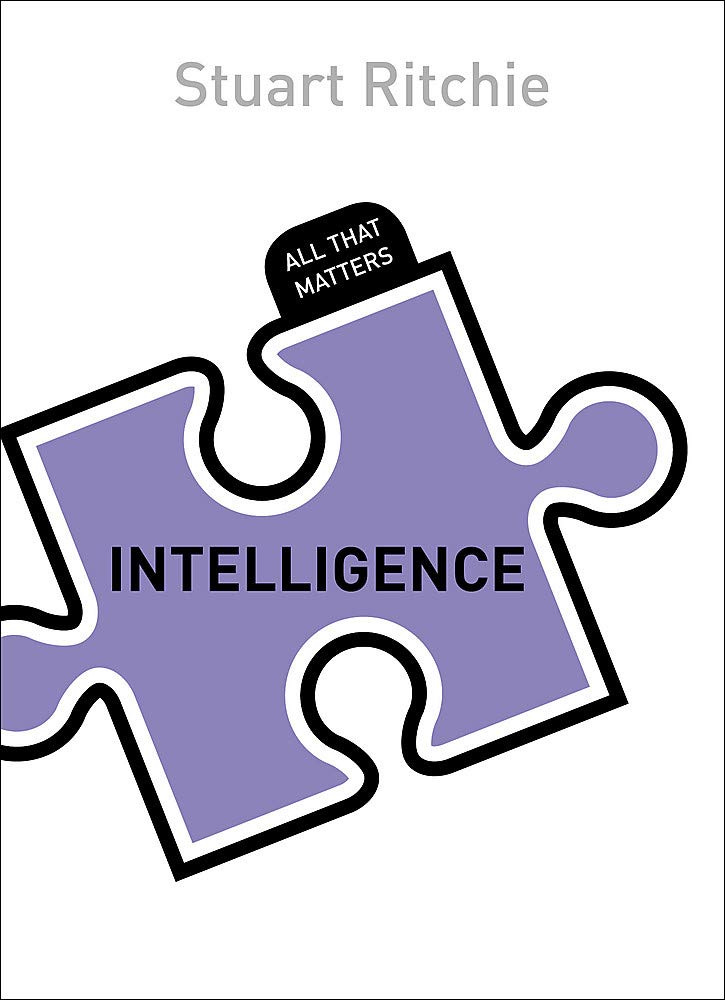Stuart Ritchie is a brilliant intelligence researcher at King’s College London. He’s also a top notch writer. If you want to learn something about human intelligence I can’t think of a better place to start than his 2016 book, Intelligence: All that matters. But if you’re too lazy for that, I’ve compiled ten myths about intelligence that are debunked in the course of his book, which has to be said is the most mainstream conservative treatment of the research.
Myth 1: “We cannot define intelligence”
People who say we cannot define intelligence are using teeing up the ol’ one-two punch of “if we can’t define it, how can we measure it?” But we can define it. Of course, like with any conceptual definition, you can always poke holes and find exceptions. Most scholars have become enamoured with quoting the following paragraph from Linda Gottfredson:
Intelligence is a very general mental capability that, among other things, involves the ability to reason, plan, solve problems, think abstractly, comprehend complex ideas, learn quickly, and learn from experience. It is not merely book-learning, a narrow academic skill, or test-taking smarts. Rather, it reflects a broader and deeper capability for comprehending our surroundings, ‘catching on’, ‘making sense’ of things, or ‘figuring out’ what to do.
As Stuart Ritchie says, would you really expect a one-line definition of such a complex trait?
Myth 2: “But there’s not just one form of intelligence? Some people are great at literacy, but terrible at numeracy! And what about Howard Gardner’s multiple intelligence model?”
This is true at one level. There obviously are multiple domains of intelligence — that’s why IQ tests have different sections! (Numeracy, literacy, memory, general knowledge etc.) But the amazing thing is that all of the sections positively correlate with one another, meaning there’s a generalisable thing called intelligence. Psychologists call this g (for general intelligence) or, if you’re feeling frisky, the “positive manifold”.
Think of it this way: if you have massive guns, can deadlift 150kg, and bench press a large tortoise, none of those individual strengths would be sufficient for measuring the concept of fitness alone. Yet they all positively correlate with one another to allow us to point to something called fitness.
Here’s Stuart Ritchie again:
It’s worth stepping back for a moment and realising how impressive this is – before we’d done the research, would we have predicted that people who are faster at moving their finger when a light blinks will be more likely to know the definition of defenestrate? Not necessarily. The positive manifold is remarkable, and it demands an explanation.
As for the people who are really good at maths but terrible at reading, yes they probably exist, but they’re quite rare when we look at the actual data. And in real life, they’re probably still better than average at reading. Even if you skip leg day, your legs will probably still be stronger than the average person who doesn’t pump iron 4 days a week.
“What about Howard Gardner’s multiple intelligence model?”
No evidence. No tests. No data. That’s the short version.
Myth 3: “Okay, but what about artistic talent, surely that’s different from intelligence?”
Yes and no, there’s definitely a lot more to an artistic genius, any genius really, than a high IQ. However, IQ is still associated with things like being able to discriminate between musical tones and rhythms, which is crucial for musical creativity. Other studies have suggested that people who score higher on IQ tests also tend to have more patents and artistic prizes.
But there are important distinctions. Most researchers bracket intelligence into fluid and crystallised intelligence. Fluid intelligence involves working things out on the basis of no previous knowledge. Crystallised intelligence is made up of the sorts of tests (like vocabulary and general knowledge) that rely on information gained outside the testing environment, in the real world. And here’s what happens to both of them over time:
So if you’re under 25 make the most of your meat computer.
Myth 4: “Your results can change from IQ test to IQ test, so it’s not very useful is it!”
Yeah, kind of, but also absolutely not.
It’s true that a psychometric test is only useful if your result doesn’t keep changing dramatically every time you sit it. This is called test-retest reliability. Tasks are included in standardised IQ tests only if they are highly reliable. Correlations from session to session tend to be around r = 0.80. As Ritchie says:
That’s high, but it’s not a perfect correlation. Scores will tend to vary across time (perhaps during one test you didn’t try as hard as you possibly could, or were staring out of the window when the examiner asked you the question), but for each person multiple scores will cluster around their ‘true’ ability level.
Myth 5: “Ahh, but people can practise IQ tests! This means that they shouldn’t be used in admissions processes!”
Most people don’t practice these tests, so they’re still useful for general research
If people do practise for an admission’s test, there are lots of tests which have such a wide range of measures that it’s almost impossible to practise and improve your score with statistical significance.
Even if everyone practised the tests, there would still be differences in the speed it takes to learn them. This is what we might call intelligence!
Myth 6: “I still think IQ tests only measure how well you perform on an IQ test or the motivation to take the test.”
I personally find a lot of IQ tasks quite boring and I don’t think I’ve ever sat through a proper full test. It’s certainly not my idea of a leisure activity. But researchers have tested the motivation thesis by paying people to do well. Unfortunately, you only see very small effects. Also, in many IQ testing situations, like college admission, the stakes are already very high, so it’s not a great hypothesis.
As for the first part of the statement (the notion that IQ tests don’t measure much), this couldn’t be more wrong! There are simply too many things we care about that IQ strongly correlates with. Here are some of the big ones:
Educational attainment: apx 0.8
Training success for the military: over 0.6
Job Performance (high complexity) apx 0.6
Training success for civilians: apx 0.6
Job Performance (medium complexity) : just over 0.5
Job Performance (low complexity): apx 0.4
Creativity: apx 0.4
Leader effectiveness: apx 0.3
And here’s the connection between IQ and mortality risk:
Some studies even find that having a low IQ is as dangerous for your health as smoking. And controlling for social class doesn’t make these correlations disappear.
Recent studies with large samples have confirmed that brighter people report higher wellbeing. To a large extent, this is due to the effects of IQ on the kinds of socio-economic and medical factors we’ve mentioned.
IQ also correlates with politics and religiosity. When we control for social class and education, we still see around a 0.45 correlation between IQ and social liberalism. But high IQ individuals are also economically liberal, being in favour of free markets.
Myth 7: “Social class determines IQ and job performance more than IQ determines social class and job performance”
There is something to this, but IQ researchers are now very good at disentangling such variables and using clever statistical regression techniques. You can measure someone’s IQ as a child, then the social class they end up in by the age of 40 (along with many other variables) and what you find is that the relationship goes both ways. Richie again:
Childhood social class has moderate links to intelligence, but intelligence also makes its own prediction of how people will do in life, over and above the class where they started off (Deary, 2005). Studies like these are evidence of at least a partial ‘meritocracy’: although there are crucial effects of social origins, opportunities and, of course, pure luck, people with higher ability do tend to end up in jobs where their skills can be put to good use.
Myth 8: “Ok, but that doesn’t mean intelligence isn’t influenced mostly by the environment?”
Correct. But it’s not. We know this from twin and adoption studies. Intelligence is around 50% heritable. We even have a new technique called Genome-wide Complex Trait Analysis that can calculate heritability directly from the DNA of large groups of people, with no need for twins or adoptees.
Now heritability doesn’t mean that 50 per cent of an individual person’s intelligence is due to their DNA. The heritability estimate is a group figure, describing the reasons for the variance in intelligence among the sample of people studied.
One of the leading researchers in behavioural genetics, Robert Plomin, has suggested that the heritability of IQ is a good measure for the level of meritocracy in a society. That’s because if we all shared identical environments — schools, friends, general upbringing — the only thing left to vary would be genetics. Countries that lack extensive welfare nets tend to show higher heritability estimates for the children of families at the higher end of the social class spectrum.
Also, it’s important to remember that services like universal health care and free education reduce overall inequality, but they can then increase the range of the remaining inequality. Why? Because when smart people suddenly have a textbook and a free doctor, they’re going to use them more effectively than less intelligent folks. This creates a higher relative inequality than before (when nobody had anything and people couldn’t exercise their natural gifts).
Myth 9: “But you have to admit, smart people are socially awkward. Surely there’s a negative relationship between intelligence and social skills?”
There’s a stereotype of the clever nerdy guy who can’t talk to girls, but there’s no evidence for a negative relationship between intelligence and social skills. In fact, the sizes of the correlations between cognitive abilities and personality traits like extraversion and agreeableness tend to be close to zero. The only real negative correlation for intelligence is short-sightedness.
Myth 10: “I heard that men are smarter than women”
No, not really. Certainly not when look at the averages. However, as Ritchie writes, the averages do hide two consistent sex differences:
The first is that there are differences in more specific abilities: women tend to do better than men on verbal measures, and men tend to outperform women on tests of spatial ability. The second is that there is a difference in variability: males tend to be over-represented at the very high and the very low levels of intelligence.
If you liked this, please do subscribe. Maybe give it a share to spread the gospel of rationality. And if you want to support my work, you can do so with a paid Substack subscription or using the following methods:
https://www.patreon.com/Ideas_Sleep
BTC wallet address: 1KHB3Mq7njTGfquABcREsiywaxmDbP2NPY
And subscribe to my YouTube Channel here.














